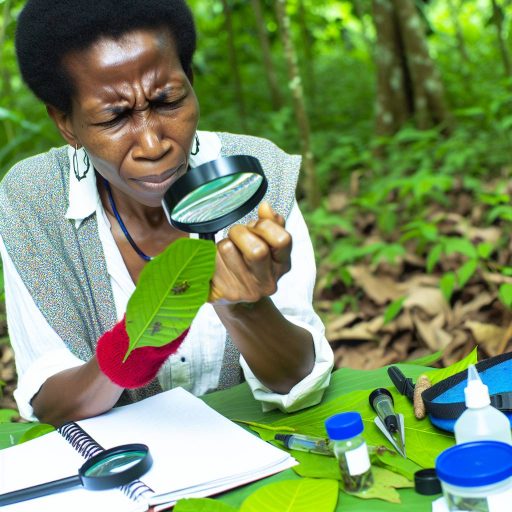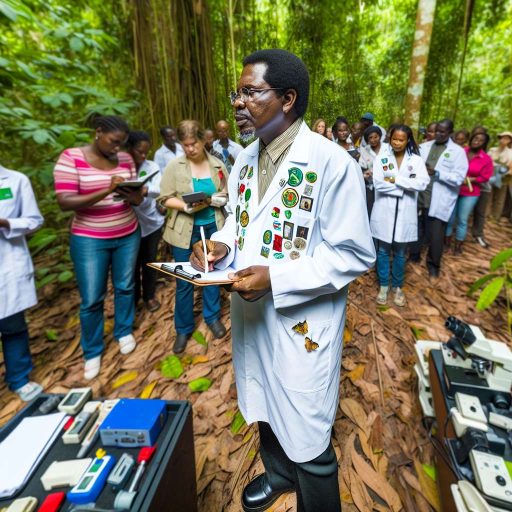Ecotourism in Nigeria
Ecotourism is a form of sustainable travel that focuses on exploring natural environments while minimizing impact.
It emphasizes responsible travel practices that prioritize conservation and local community involvement.
The importance of ecotourism lies in promoting sustainability by supporting conservation efforts, preserving biodiversity, and fostering cultural exchange.
It also contributes to the economic development of local communities and helps in protecting natural habitats.
In Nigeria, there are abundant ecotourism opportunities waiting to be explored.
With diverse ecosystems including rainforests, savannahs, and mangrove swamps, the country offers unique experiences for nature enthusiasts.
From exploring the wildlife-rich Yankari National Park to hiking in the beautiful Obudu Mountain Resort, Nigeria boasts a variety of ecotourism destinations.
Visitors can also enjoy birdwatching in the lush forests of Okomu National Park or take a boat ride through the picturesque Niger Delta.
By promoting ecotourism in Nigeria, we can showcase the country’s natural beauty and support conservation efforts and local communities.
It is an opportunity to engage with nature responsibly and contribute to the sustainable development of the region.
Ecotourism presents a valuable opportunity to experience and preserve Nigeria’s natural heritage.
By engaging in sustainable travel practices, we can help protect the environment and create lasting positive impacts for future generations.
Ecotourism Sites in Nigeria
Yankari National Park
Located in Bauchi State, this park is known for its diverse wildlife and natural hot springs.
Visitors can enjoy safari tours, bird watching, and swimming in the springs.
With proper infrastructure and promotion, Yankari has the potential to attract more tourists.
Obudu Mountain Resort
Situated in Cross River State, this resort offers stunning views of the surrounding mountains.
Tourists can engage in activities like hiking, horseback riding, and canopy walks.
As more people seek adventure travel, Obudu could see an increase in ecotourism visits.
Kainji National Park
Located in Niger State, this park is famous for its diverse ecosystem and wildlife.
Activities include game drives, boat cruises on the lake, and camping.
Improved facilities and conservation efforts could boost Kainji’s appeal to eco-conscious travelers.
Cross River National Park
Spread across Cross River and Akwa Ibom States, this park is a biodiversity hotspot.
Visitors can explore the rainforest, go bird watching, and spot endangered species.
With sustainable practices and community involvement, Cross River Park can become a model for ecotourism.
Lekki Conservation Centre
Located in Lagos State, this center offers a glimpse into Nigeria’s natural habitats.
Activities include canopy walks, wildlife viewing, and conservation education programs.
As urban dwellers seek nature-based activities, Lekki Conservation Centre has the potential for growth.
Potential for Ecotourism Growth in Nigeria
Nigeria has a wealth of ecotourism sites that offer glimpses into its diverse landscapes and rich biodiversity.
By harnessing the potential of these locations, the country can only attract more tourists but also promote conservation efforts and sustainable development.
With the right infrastructure, promotion, and community involvement, ecotourism in Nigeria can thrive and create economic opportunities for local communities.
It is essential to prioritize environmental protection and cultural preservation to ensure the long-term sustainability of these ecotourism sites.
By investing in ecotourism development, Nigeria can showcase its natural beauty to the world while also reaping the benefits of responsible tourism.
As global interest in sustainable travel grows, the country has the opportunity to position itself as a leader in ecotourism in Africa.
Conservation Efforts in Nigeria
Exploring conservation projects and initiatives in Nigeria.
- Efforts to protect endangered species
- Preservation of natural habitats
Discussing the role of local communities in preserving natural habitats and wildlife.
The involvement of local communities is crucial.
They help in monitoring and protecting the environment.
Local knowledge is valuable in preserving biodiversity.
- Traditional practices can help conservation efforts
- Engaging communities in eco-friendly practices
Highlighting success stories and challenges faced in conservation efforts.
Success stories showcase the positive impact of conservation.
Transform Your Career with Expert Guidance
Get personalized mentorship consulting that’s tailored to your unique path. Our expert advice is actionable and exclusive.
Get StartedChallenges include funding, poaching, and illegal logging.
- Collaboration with government agencies and NGOs
- Education and awareness programs for local communities
Conservation efforts require continuous monitoring and adaptation.
Adapting to changing environmental conditions is crucial.
Conservation efforts contribute to sustainable development in Nigeria.
Preserving natural habitats and wildlife is essential for future generations.
Find Out More: Environmental Management and Climate Change in Nigeria
Wildlife and Biodiversity in Nigeria
Nigeria is rich in wildlife and biodiversity, offering a unique opportunity for ecotourism enthusiasts to explore the diverse flora and fauna found in the country.
From lush rainforests to savannas teeming with wildlife, Nigeria has something to offer for every nature lover.
Flora and Fauna in Nigeria
Nigeria is home to a wide variety of plant and animal species, including elephants, lions, leopards, and a plethora of bird species.
The country’s diverse ecosystems provide a habitat for these creatures to thrive, making it a hotspot for wildlife enthusiasts.
Preserving Wildlife and Biodiversity
Preserving wildlife and biodiversity is crucial for the success of ecotourism in Nigeria.
By protecting the natural habitats of these species, we can ensure their survival for future generations to enjoy.
Conservation efforts play a significant role in safeguarding endangered species and maintaining the delicate balance of ecosystems.
Endangered Species and Conservation Efforts
Some of the endangered species in Nigeria include the African elephant, African wild dog, and the Cross River gorilla.
Conservation organizations such as the Nigerian Conservation Foundation (NCF) work tirelessly to protect these species through habitat preservation, anti-poaching initiatives, and community education programs.
See Related Content: Essential Skills for Estate Management Students
Explore the rich cultural heritage of Nigeria
Nigeria is a country with a diverse cultural landscape. It boasts over 250 ethnic groups. Each group has its unique traditions, languages, music, art, and cuisines. This diversity makes it a melting pot of culture waiting to be explored through ecotourism.
Discuss how ecotourism can promote cultural exchange and preservation
Ecotourism provides a platform for visitors to engage with local communities. Tourists can learn about their ways of life. By participating in cultural activities, they can foster mutual understanding and respect. This contributes to the preservation of Nigeria’s heritage.
Highlight traditional practices, festivals, and crafts that can be experienced through ecotourism
From the colorful Durbar Festival in Kano to the mystical Osun-Osogbo Festival in Osun State, ecotourists have opportunities to witness traditional ceremonies. These celebrations have been passed down through generations.
Visitors can also learn traditional crafts. Activities such as bead-making, weaving, and pottery can be experienced directly from skilled artisans. This offers insight into the intricate craftsmanship that defines Nigerian culture.
Moreover, ecotourism offers a chance to experience unique practices. Examples include the Gelede mask performances of the Yoruba people. The Durbars of the Northern Emirates and the Igogo Festival of Owo also highlight cultural richness.
These events provide a glimpse into the country’s vibrant history and traditions. In addition to participating in cultural activities, tourists can support local communities. They can do this by purchasing handmade crafts and products.
This actions contribute to the economic empowerment of indigenous artisans. This sustainable approach ensures that traditional skills and practices are preserved. They can be passed on to future generations.
Cultural experiences in ecotourism offer a deeper understanding of Nigeria’s diverse heritage. They also play a vital role in promoting cultural exchange. Additionally, ecotourism fosters community development and preserves the country’s cultural legacy for generations to come.
Discover More: Impact of Industrialization on Nigeria’s Environment

When it comes to ecotourism in Nigeria, sustainability is key to preserving the natural beauty and culture of the country.
Here are some sustainable practices to consider:
Principles of Sustainable Ecotourism
- Minimize impact on the environment
- Support local communities and economies
- Protect natural and cultural heritage
- Educate visitors about conservation efforts
- Promote responsible travel behavior
By following these principles, ecotourism can have a positive impact on the environment and communities in Nigeria.
Eco-Friendly Accommodations, Tours, and Activities in Nigeria
- Stay at eco-lodges or camps that prioritize sustainability
- Book guided nature tours with local experts
- Participate in conservation projects or wildlife monitoring activities
- Explore national parks and protected areas with responsible tour operators
- Engage in cultural experiences that support local traditions and artisans
These eco-friendly options allow travelers to experience the beauty of Nigeria while minimizing their environmental impact.
Tips for Travelers to Engage in Responsible and Sustainable Ecotourism Practices
- Respect wildlife and habitats by observing from a distance
- Dispose of waste properly and pack out trash from natural sites
- Support local businesses and buy souvenirs from artisans
- Choose eco-friendly transportation options like walking, cycling, or public transit
- Learn about the local culture and customs to show respect to communities you visit
By following these tips, travelers can contribute to the conservation and sustainable development of ecotourism destinations in Nigeria.
Sustainable practices play a crucial role in ecotourism in Nigeria.
By adopting eco-friendly accommodations, tours, and activities, as well as following responsible travel tips, visitors can make a positive impact.
It is essential to support initiatives that prioritize sustainability and conservation efforts.
This is to ensure the preservation of Nigeria’s natural and cultural heritage for future generations to enjoy.
Delve into the Subject: Air Quality Monitoring in Nigerian Cities
Economic Benefits of Ecotourism
Ecotourism in Nigeria has a significant economic impact on the country.
Let’s explore the various ways in which ecotourism contributes to the economy:
- Job Creation: Ecotourism creates employment opportunities for local communities, ranging from tour guides to hospitality staff, thus reducing unemployment rates.
- Revenue Generation: Through ecotourism, Nigeria generates revenue from entrance fees, accommodation, and other tourism-related activities, boosting the economy.
- Local Empowerment: Ecotourism empowers local communities by involving them in decision-making processes, providing them with a source of income and improving their livelihoods.
- Contribution to Economic Growth: The growth of ecotourism in Nigeria has the potential to contribute to the overall economic development of the country, attracting foreign investment and boosting GDP.
Ecotourism not only promotes environmental conservation but also brings about tangible economic benefits to Nigeria, contributing to sustainable development.
Ecotourism’s Importance in Nigeria
Ecotourism plays a crucial role in Nigeria.
It promotes sustainable practices and conservation efforts.
This approach provides economic benefits to local communities.
Additionally, it helps protect the country’s unique ecosystems.
Exploring ecotourism opportunities in Nigeria is encouraged.
Visitors can experience the beauty of its natural landscapes.
They will also encounter diverse wildlife while contributing to the local economy.
Practicing responsible travel is essential for visitors.
Respecting the environment and local culture is vital.
Support for eco-friendly accommodations is encouraged.
Participating in community-based tourism initiatives benefits everyone.
By doing so, we can preserve Nigeria’s natural and cultural heritage.
This preservation is crucial for future generations to enjoy.
Additional Resources
Assessing awareness on biodiversity conservation among Nigerians …
Assessing awareness on biodiversity conservation among Nigerians …




